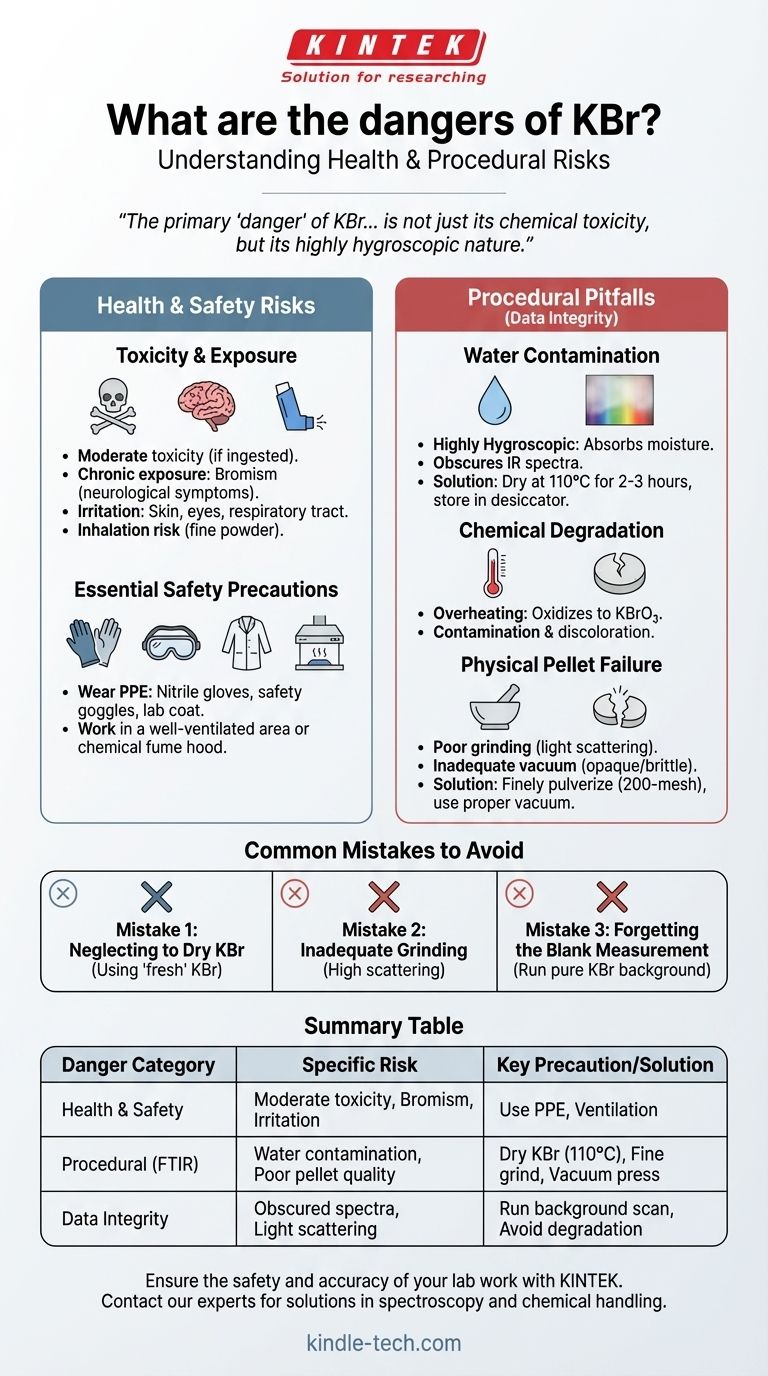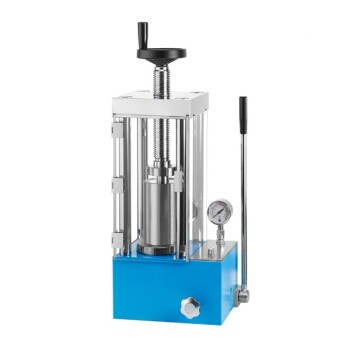En esencia, los peligros del bromuro de potasio (KBr) se dividen en dos categorías distintas. La primera son los riesgos directos para la salud asociados con su toxicidad moderada y su potencial de irritación. La segunda son los riesgos de procedimiento, particularmente en aplicaciones sensibles como la espectroscopia FTIR, donde un manejo inadecuado puede comprometer la integridad de su muestra y la precisión de sus resultados.
El principal "peligro" del KBr en un entorno de laboratorio no es solo su toxicidad química, sino su naturaleza altamente higroscópica. La falta de control de la humedad conduce a muestras contaminadas y datos analíticos inválidos, lo que representa un riesgo significativo para el éxito de su trabajo.

Comprensión de los riesgos para la salud y la seguridad
Aunque se usa a menudo en laboratorios, el KBr no es benigno y requiere precauciones estándar de manejo de productos químicos. Comprender su perfil de salud específico es el primer paso para un manejo seguro.
Toxicidad y exposición
El KBr se considera moderadamente tóxico si se ingiere. La exposición aguda a grandes dosis puede provocar síntomas como náuseas, vómitos y depresión del sistema nervioso central.
La exposición crónica o repetida es una preocupación más significativa, ya que puede conducir a una condición conocida como bromismo. Esto resulta de la acumulación de iones bromuro en el cuerpo, lo que puede causar una variedad de síntomas neurológicos, incluyendo confusión, irritabilidad, temblores y pérdida de memoria.
El contacto directo también puede causar irritación en la piel, los ojos y el tracto respiratorio. El polvo fino de KBr se inhala fácilmente, lo que hace que la ventilación sea crucial.
Precauciones de seguridad esenciales
Dados estos riesgos, el equipo de protección personal (EPP) adecuado es innegociable cuando se trabaja con KBr.
Siempre use guantes de nitrilo, gafas de seguridad y una bata de laboratorio. Cuando manipule polvo de KBr, especialmente durante la molienda o el pesaje, trabaje en un área bien ventilada o bajo una campana extractora de humos para evitar la inhalación.
Errores de procedimiento: Los peligros para sus datos
En el contexto de la preparación de pastillas de KBr para espectroscopia FTIR, los "peligros" son factores que amenazan la calidad y validez de su análisis. Estos suelen ser sutiles y se relacionan directamente con las propiedades químicas del KBr.
El problema de la contaminación por agua
El KBr es extremadamente higroscópico, lo que significa que absorbe fácilmente la humedad de la atmósfera. Este es el mayor riesgo de procedimiento.
El agua tiene fuertes bandas de absorción en el espectro infrarrojo, lo que oscurecerá las características espectrales de su muestra real. Para evitar esto, el KBr debe secarse completamente, generalmente a 110 °C durante 2-3 horas, y almacenarse en un desecador.
Riesgo de degradación química
Calentar el KBr demasiado rápido o a temperaturas excesivamente altas puede hacer que se oxide a bromato de potasio (KBrO₃).
Esta degradación no solo contamina su pastilla, sino que también puede causar decoloración, alterando las propiedades ópticas de la pastilla e interfiriendo con su medición.
Fallo físico de la pastilla
La calidad física de la pastilla de KBr es primordial para obtener buenos datos. Dos factores son críticos.
Primero, el polvo de KBr debe estar finamente pulverizado (hasta un tamaño de partícula de malla 200) para minimizar la dispersión de la luz, lo que provoca líneas de base inclinadas y reduce la calidad de la señal. Segundo, un vacío inadecuado durante el prensado atrapará aire, lo que resultará en una pastilla opaca o quebradiza que se rompe fácilmente.
Errores comunes a evitar
Estos peligros de procedimiento se manifiestan como errores comunes de manipulación. Ser consciente de ellos es clave para generar datos fiables.
Error 1: No secar el KBr
Asumir que el KBr "fresco" de un recipiente está lo suficientemente seco es un error frecuente. Siempre realice el paso de secado inmediatamente antes de usarlo para eliminar la humedad atmosférica adsorbida.
Error 2: Molienda inadecuada
La molienda insuficiente de la mezcla de KBr y muestra es una causa principal de espectros de mala calidad. Esto conduce a una alta dispersión y puede hacer imposible interpretar los resultados.
Error 3: Olvidar la medición en blanco
Muchos usuarios olvidan ejecutar un espectro de fondo utilizando una pastilla de KBr pura. Este paso es esencial para corregir cualquier humedad residual, efectos de dispersión o variaciones del instrumento, asegurando que el espectro final muestre solo su muestra.
Tomar la decisión correcta para su objetivo
Su enfoque para el manejo del KBr debe estar dictado por su objetivo principal, ya sea la seguridad personal o la precisión analítica.
- Si su enfoque principal es la seguridad personal: Siempre use guantes y protección ocular, y manipule el polvo de KBr en un espacio bien ventilado para evitar la inhalación y el contacto directo.
- Si su enfoque principal son los datos FTIR precisos: Su objetivo principal es eliminar el agua secando rigurosamente el KBr, moliéndolo finamente y realizando un escaneo de fondo adecuado.
- Si su enfoque principal es la eficiencia: Seguir estos pasos de preparación correctamente la primera vez ahorra horas de resolución de problemas y de repetición de experimentos fallidos.
En última instancia, dominar el manejo adecuado del KBr garantiza tanto su seguridad personal como la integridad de sus resultados científicos.
Tabla resumen:
| Categoría de peligro | Riesgo específico | Precaución/Solución clave |
|---|---|---|
| Salud y seguridad | Toxicidad moderada (bromismo), irritación de piel/ojos, riesgo de inhalación | Usar EPP (guantes, gafas), trabajar en campana extractora, asegurar ventilación |
| Procedimiento (FTIR) | Contaminación por agua debido a la naturaleza higroscópica, mala calidad de la pastilla | Secar KBr a 110°C, moler a malla 200, usar prensado al vacío adecuado |
| Integridad de los datos | Espectros IR oscurecidos, dispersión de luz, resultados inexactos | Realizar un escaneo de fondo con KBr puro, asegurar molienda fina, evitar degradación |
Garantice la seguridad y precisión de su trabajo de laboratorio con KINTEK.
Navegar por los peligros del bromuro de potasio (KBr) requiere precisión y el equipo adecuado. KINTEK se especializa en equipos y consumibles de laboratorio de alta calidad diseñados para mitigar estos riesgos. Desde hornos de secado y desecadores confiables para materiales sensibles a la humedad hasta prensas de precisión para pastillas de KBr perfectas, nuestros productos le ayudan a lograr resultados FTIR claros y sin contaminar, al tiempo que protegen la salud de su equipo.
No permita que un manejo inadecuado comprometa su investigación. Contacte hoy mismo a nuestros expertos a través de nuestro Formulario de Contacto para encontrar las soluciones perfectas para las necesidades específicas de su laboratorio en espectroscopia y manejo de productos químicos.
Guía Visual

Productos relacionados
- Prensa de pastillas KBR 2t
- Molde de prensa de pastillas de polvo de laboratorio de anillo de acero XRF y KBR para FTIR
- Molde de prensa de pastillas de polvo de laboratorio de anillo de plástico XRF & KBR para FTIR
- Prensa Hidráulica de Laboratorio para Pellets para Aplicaciones de Laboratorio XRF KBR FTIR
- Máquina automática de prensa de pastillas hidráulica de laboratorio para uso en laboratorio
La gente también pregunta
- ¿Cómo funciona un extractor rotatorio? Domine el procesamiento continuo de sólidos de alto volumen
- ¿Qué sucede durante la etapa de recocido? Una guía para la transformación del metal en tres etapas
- ¿Qué se necesita para el recocido? Domina las 3 etapas críticas para la transformación de materiales
- ¿Qué usos industriales tienen los diamantes? Descubra aplicaciones de alto rendimiento
- ¿Qué es la sinterización en términos mecánicos? Fusionar polvos en componentes fuertes y densos
- ¿Es mejor la centrifugación o la filtración? Una guía para elegir el método de separación correcto para su laboratorio
- ¿Cuáles son las ventajas de la pirólisis sobre la incineración? Logre una transformación de residuos más limpia con recuperación de recursos
- ¿Por qué se requiere un horno de secado por aire forzado de grado de laboratorio para el análisis de humedad de virutas de aleación? Garantizar la precisión de los datos



















